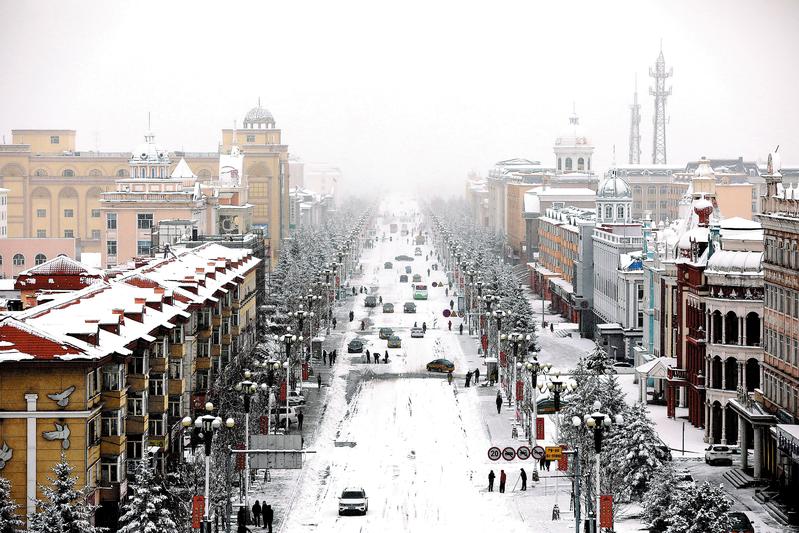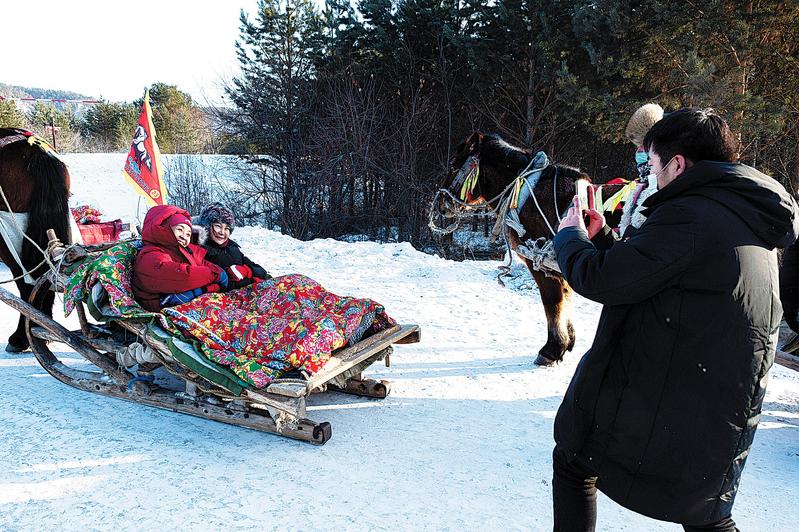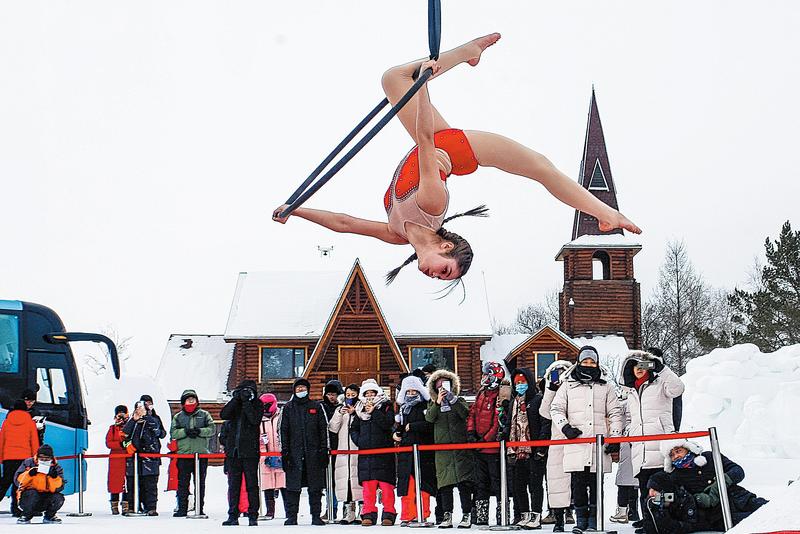 (SONG CHEN / CHINA DAILY)
(SONG CHEN / CHINA DAILY)
On the morning of Oct 23, Chinese singer-songwriter Liu Shuang arrived in Heze city, Shandong province, with his band to perform at an outdoor music festival.
One hour before they checked their equipment and tested the sound, they were told that the event had been canceled due to the coronavirus pandemic.
Liu and the band were soon on their way back to Beijing, where they are based.
On the train to the Chinese capital, Liu received a message on Sina Weibo, saying that his song Mohe Ballroom had gone viral on the Douyin video-sharing platform.
However, he did not take the message seriously until the next day, when he learned that footage of the song had been viewed more than
10 million times on Douyin.
Liu, 29, now one of the most talked about Chinese singer-songwriters, said: “My team and I were overwhelmed by this sudden fame. It was like a dream come true, as we had been working hard to get our songs known by a wider audience.
“I initially tried to stay calm, but I was very excited and couldn’t help checking social media platforms to read reviews and messages about myself and the song.”
 Tourists enjoy the snow at China’s northernmost skiing destination, the Arctic Ski Resort in Mohe, Heilongjiang province, in October. (SHAO TIANLI / FOR CHINA DAILY)
Tourists enjoy the snow at China’s northernmost skiing destination, the Arctic Ski Resort in Mohe, Heilongjiang province, in October. (SHAO TIANLI / FOR CHINA DAILY)
In less than two days, the video of the song had been viewed some 700 million times.
Mohe Ballroom was released in June last year and featured in Liu’s third album, First Planet.
The song was inspired by Liu’s trip in 2019 to Mohe, Heilongjiang province, China’s northernmost city, where he met an elderly man who was dancing alone in a ballroom.
“I was curious and danced with him. We talked for a while during a break, when I learned about his story,” said Liu, who later wrote an article titled Goodbye Evening Star, which he published on his social media platform.
Mohe Ballroom, written in March last year, is based on the old man’s story. On May 6, 1987, about 200 people were killed when a fire that broke out in mountains near Mohe tore through the city. The fire, which lasted 28 days, destroyed more than 10,000 square kilometers of forest. Direct economic losses were estimated at 500 million yuan ($78.6 million).
The elderly man, who uses the pseudonym Zhang Dequan, lost his wife to the blaze. He has not remarried and has no children, so he often visited the old ballroom and danced alone to remember the times he and his wife spent there.
“Both the article and the song have been fictionalized, and I added some additional details. To me, the most important part of the song is the lyrics. I wanted to dedicate Mohe Ballroom to those who lost their lives in that big fire,” Liu said.
 Visitors celebrate the new snow season at the ski resort. (SHAO TIANLI / FOR CHINA DAILY)
Visitors celebrate the new snow season at the ski resort. (SHAO TIANLI / FOR CHINA DAILY)
In October, footage of the man dancing alone was posted online anonymously by a netizen, and the Mohe Ballroom video and the story behind the song were also shared on the internet.
Hundreds of thousands of people have been touched by the story and the song’s sentimental melody and romantic lyrics. Videos featuring elderly men dancing alone have appeared on social media platforms.
A number of people curious about the ballroom and the old man have even traveled to Mohe to locate him and the venue.
One listener said, “The song is meant to be heard alone, preferably through headphones.”
Another listener said: “It’s easy to see why Mohe Ballroom resonated with listeners when it did. Full of emotional detail and poetic lyrics, the song, with Liu’s whispery vocals, fulfills people’s imaginations about a tragic love story.”
Liu said, “Many media platforms contacted me and my team to ask for detailed information about the old man — requests which we turned down.
“Videos of Mohe Ballroom have been viewed millions of times, but few of them are legal. I really appreciate that people love the song, but I never expected it to become a talking point like this. It’s way too much.”
Liu is, however, upset when people refer to him as a singer who gained overnight fame on the internet.
 Mohe is one of few places in China with a subarctic climate — long, severe winters and short, warm summers. (WANG JINGYANG / CHINA NEWS SERVICE)
Mohe is one of few places in China with a subarctic climate — long, severe winters and short, warm summers. (WANG JINGYANG / CHINA NEWS SERVICE)
Born and raised in Kuqa city, Aksu prefecture, Xinjiang Uygur autonomous region, the self-taught singer-songwriter graduated from People’s Public Security University of China with a major in public security traffic management.
Liu made his stage debut in 2014, performing his original song Grandpa during a year-end gala at the university. Since then, he has been writing his own material.
After graduating in 2015, he worked as a police officer in Beijing for two years before launching a full-time career as an independent singer-songwriter. In 2018, he released his debut album Grow and toured nationwide.
Speaking about the first show he performed, Liu said: “Tickets sold for 60 yuan and there were 423 people in the audience, including 19 of my friends. I was very nervous and my hands shook while I played guitar.”
Before finding fame through Mohe Ballroom, Liu enjoyed a small but loyal fan base, building his music career step by step.
“When I have something on my mind that is haunting me, which I cannot convey through words, writing a song is a way to make that feeling clear,” he said.
 Tourists take a sledge trip in Beiji village, Mohe. (XIE JIANFEI / XINHUA)
Tourists take a sledge trip in Beiji village, Mohe. (XIE JIANFEI / XINHUA)
Despite attracting sudden fame, Liu is trying to stick to his routines, such as writing songs and touring. On Oct 30, he released a new song, EP02 Rose, in which he sings about love and romance.
“I am planning to give my first show since Mohe Ballroom became such a big hit. I will sing this song again without any pressure, like many other times that I have performed it during my concerts,” Liu said.
The song’s huge popularity has made Mohe an in-demand tourism destination. Visitors flock to the city to see the ballroom, in the hope of meeting the elderly man.
Li Jinbao, who owns the ballroom, told Beijing News: “The man often visited my ballroom in 2019. However, since the emergence of the pandemic, I have not seen him.
“I was 21 when I witnessed the fire that swept through Mohe. The city was later rebuilt and its first public ballroom opened, which immediately became popular among local residents.”
But as other forms of entertainment became popular, demand for ballrooms began to fall.
As he loved dancing, Li, who is now 55, started the ballroom in 2018, but the business was not a success.
“I had decided to close the ballroom, but one day I received a young visitor from Shenzhen, Guangdong province,” he said. “He told me he had traveled more than 20 hours from Shenzhen to Mohe, just to visit my ballroom.”
 A winter games competitor shows her skills in Beiji, 88 kilometers from downtown Mohe. (PHOTO PROVIDED TO CHINA DAILY)
A winter games competitor shows her skills in Beiji, 88 kilometers from downtown Mohe. (PHOTO PROVIDED TO CHINA DAILY)
Li then changed his mind about closing the venue.
“I will continue with the ballroom, providing a place for those who love dancing, especially seniors,” he said.
Some local residents have become curious about the ballroom, which they had never noticed before.
Zhang Wenqian, 30, a civil servant, visited the venue for the first time after she viewed Mohe Ballroom online.
“This is a good chance to promote our city nationwide,” she said. “At the same time, the song also reminds residents of painful memories and of the need to prevent a similar incident.
“Although I didn’t experience the fire, I have been told stories about it since childhood. Our city also holds commemorative activities on May 6 every year to remind us of the past.”
Mohe is one of few places in China with a subarctic climate — long, severe winters and short, warm summers. Winter begins in early to mid-October and lasts until late April. The city holds the record for China’s lowest temperature — minus 52.3 C in 1956.
But if the climate suggests an inhospitable place, this is not the case. The border with Russia has a raw beauty, attracting countless tourists every year, although they mostly visit in summer to witness the aurora borealis, or northern lights.
Beiji village, 88 kilometers from Mohe city center, attracts nearly all tourists to the area and boasts China’s northernmost bank and post office, as well as a painted line marking the northernmost point in China.
 Singer-songwriter Liu Shuang. (PHOTO PROVIDED TO CHINA DAILY)
Singer-songwriter Liu Shuang. (PHOTO PROVIDED TO CHINA DAILY)
Tourists look out on the Russian border from the village and also observe the aurora borealis in Shenzhou Beiji Square during summer, when daylight lasts for up to 20 hours.
The local tourism department has been quick to seize the chance brought by Mohe Ballroom.
In October, the city’s bureau of culture, radio, film, television, tourism and sports published several short videos about the song on its WeChat account, inviting tourists to travel to Mohe.
Feng Guangqing, director of the bureau, told China Tourism News: “The local government has developed the tourist industry since 1981. However, due to the long distances involved and inconvenient transportation links, we haven’t seen a large influx of tourists like some other well-known tourist destinations.
“The song makes people feel that the city welcomes them, attracting more tourists, especially those who haven’t visited Mohe before.”
On Nov 11, the Mohe authorities published a statement wherein they appealed for touching stories about the city.
Mohe has a long history, profound cultural heritage, the statement said, noting that Mohe Ballroom has touched the hearts of millions of people.
Residents can submit their stories about love, family relationships and heroic activities in writing or through audio and video recordings to the publicity department in Mohe.
The appeal launched by the city is aimed at promoting positive energy in society.
Contact the writers at chennan@chinadaily.com.cn


